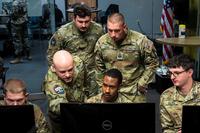Airmen and Guardians who are women or racial minorities aren't seeing their careers advance as quickly as their white male counterparts, a new Air Force inspector general report has found.
And the lack of career opportunities for Hispanic, Latino, Asian, Native American or Pacific Islander, and female service members has major implications -- not only for their careers, but for the Air Force and Space Force's leadership as a whole.
Air Force Inspector General Lt. Gen. Sami Said on Thursday released the results of the department's second study on racial disparities in the ranks.
Read Next: Pentagon Chief: Al-Qaida May Seek Comeback in Afghanistan
The first study, released last December, focused on Black airmen's experiences in the service, and found similar career development disparities.
The second study looks at a different group of service members but, taken together, it paints a picture of services that are -- even if it may be unintentional -- treating troops differently based on their gender and ethnicity.
"It basically points out very clearly, I think very convincingly, there are a lot of disparities within the Air Force, in a number of facets of the Air Force experience," Air Force Secretary Frank Kendall told reporters in a conference call. "This includes things like promotions, how people are treated in their careers, how they're treated in assignments, how they're treated under the judicial system."
Hispanic and Latino, Asian American, and Native American officers were promoted to major, lieutenant colonel or colonel below the average rates, the study found. On the enlisted side, Hispanic and Latino service members were promoted below the average rate to all ranks, except E-7, and Asian American enlisted members were promoted more slowly than the overall average to the ranks of E-6 through E-9.
Asian American officers are the least likely group to hold leadership roles in the Air Force, the report found. From 2015 to 2020, 2.7% of colonels in the active-duty Air Force were Asian American, but they made up only 0.7% of wing commanders. Asian American officers also were significantly underrepresented among group and squadron commanders, command chiefs and first sergeants -- a trend also seen among Hispanic, Latino and Pacific Islander officers.
The operations career fields -- particularly the ranks of pilots -- are overwhelmingly white and male in the Air Force. And because the Air Force has tended to choose its leaders from those ranks, it has worsened the racial imbalance in the ranks and led to fewer situations where racial minorities or women can have mentors who relate to their experiences.
Asian American officers were more than 10% more likely to leave the service before reaching 10 years in uniform than their white counterparts.
One in three female airmen or Guardians, and one in four female civilians in the department, reported experiencing sexual harassment in their careers.
Though the report details many examples of how racial disparities exist, the Air Force has not yet delved into what the root causes may be -- something Kendall called a "fundamental thing that we have to get at."
Said said the Air Force will order organizations -- such those responsible for accessions, training, education and military justice -- to do a "root cause analysis" and propose changes to policies that will address those disparities.
-- Stephen Losey can be reached at stephen.losey@military.com. Follow him on Twitter @StephenLosey.
Related: Air Force Orders New Review of Racial Disparities Focused on Asian, Hispanic Communities












